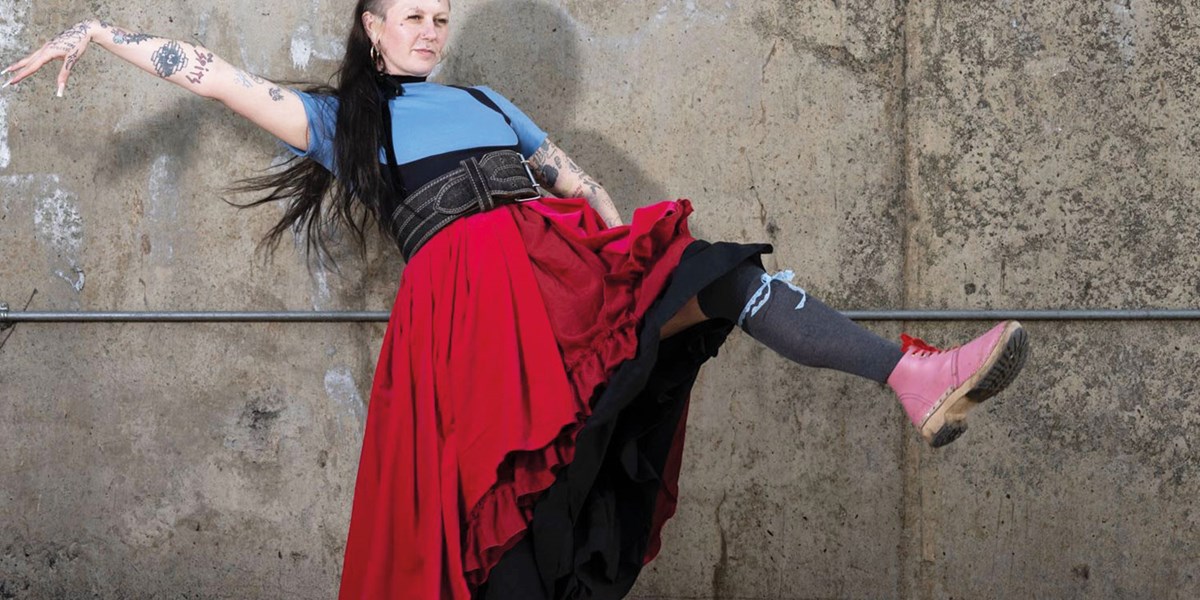Thursday, April 10, 2025
Jennifer Reid’s Ballad of the Gatekeeper: reclaiming folk for the marginalised
By Eliza Carthy
During their recent tour, Eliza Carthy sat down with Jennifer Reid to discuss a new release of underrepresented and original Lancashire folk songs

Eliza: Okay, a new album coming out, crowdfunded, what is it called?
Jennifer: The Ballad of the Gatekeeper. I wrote it to address some of the, I’m going to say, gaps in the underrepresented communities that haven’t been represented in the standard folk canon as we have come to know it. I feel like the folk scene that we’re in is a product of the 1960s folk revival. I’m just trying to work with what we’ve got, adding a bit more research into it from the past, like the Victorian stuff that I do, in order to give people a fighting chance to feel included in the folk scene where they wouldn’t necessarily have felt included before.
E: Are you talking about marginalised communities, or communities who just wouldn’t naturally be attracted to what is, in essence, quite a middle-class scene?
J: Both of those things. About how South Asian garment workers can feel represented in the songs of Lancashire weaving, and then also welcoming queer people into a scene [that takes place in] the back of a working men’s club or the back room of a pub where queer people might feel that they can’t present as themselves in those short-sighted, almost ignorant, spaces.
E: How are you manifesting this? Can you talk about the 19th-century industrial material you’ve been working on first?
J: My general practice is singing, researching and teaching about collecting 19th-century Industrial Revolution work songs. Weaving, mining, canals… They’re the industries that I feel most at home with; other people specialise in sea shanties, quarry songs, all that kind of industry. But by giving north Manchester a voice in my work, as well as Lancashire, I feel like I’ve cornered a market there. Then, I like to make broader links to the macrocosm of the world and the global sweatshops, the whole global capitalist landscape that we’re dealing with. Then in the album, I’ve started off with two songs that I’ve been touring with you, that have nailed-on stuff people have heard before, then three or four songs that I haven’t done before, but they haven’t really been performed before by folk revivalists or contemporary musicians.
E: Where are you getting these from? Pamphlets? Collections?
J: Garlands of collections of poetry that are published hardback. There’s a book called Lancashire Garland – loads in there. And just having a deep dive into some of my favourite authors, picking out songs where maybe the top ten have been done, but I’m in the 11 to 20s now, picking out the lesser-known ones; but people that are into the Lancashire dialect will know what I’m talking about and, they’re still the poster people of these songs.
E: The southern English equivalent would be reading Thomas Hardy, finding things that he included in his works, songs people used to sing, dances…
J: 100%. I’ve chosen old songs that people are familiar with, lull them in with that for the first two tracks, and then the next four are new, but very much my style. Then, the second side of the album is all new material that I’ve written that I just feel has been dying to come out of me. I went on retreat, and was walking on the Moors, singing so free and loud and being a right gobshite; it all came out of me. I thought, actually, I feel now I can be authentically myself. At the start of my career I wore long sleeves. I didn’t want anyone to see I had tattoos. I wanted to present this kind of cutesy, safe image, like I didn’t have any piercings. And then I started playing in punk bands more and more. My bollocks grew a little bit. I started to marry the punk and the folk aesthetics together, which is just me being more me. Now it’s like, ‘fucking hell, you can’t stop me.’ I’m going worse! I’m getting costumes made. I’m going mental!
E: When we first started coming on the road together, you weren’t sure about my audience, how they would respond. Our first gigs were in the South, and you said, “I don’t know if they’re going to understand a word of what I’m fucking saying!” [That was] a year ago. Have you found out that my audience is delighted by you? Because I think they are.
J: I think they are. They’re excited to tell me what I bring up for them, which is fucking sick, so important. When people come up to me from Droylsden or Failsworth, that’s so cool. You realise you’re giving them a gift. I’m not scared of them. We’re sharing something together which is very powerful.
E: They do want the new blood. They want somebody gobby to come up and go, “Do you remember what it was like to be excited?” They’ll come up and they’ll tell you their life story. I love that. I really do. I even love it when people come up to me and say, “I saw your mum in 1972!” It’s getting people’s stories going again.
J: You don’t know the impact you have. Celebrating that oral tradition of sharing stories. That person might have spent 30 years working as a tyre fitter in Farnworth, they’re coming up to you, and they’re so buzzing, they’re telling you about their Aunt Maria, and where they used to live, that they used to have a chip shop on Cook Gate. It’s so cool because all that really small local history is where all the power is. That’s people’s lives, every day. That’s the important stuff.
To contribute to Jennifer Reid’s crowdfunder, visit crowdfunder.co.uk/p/the-ballad-of-the-gatekeeper

